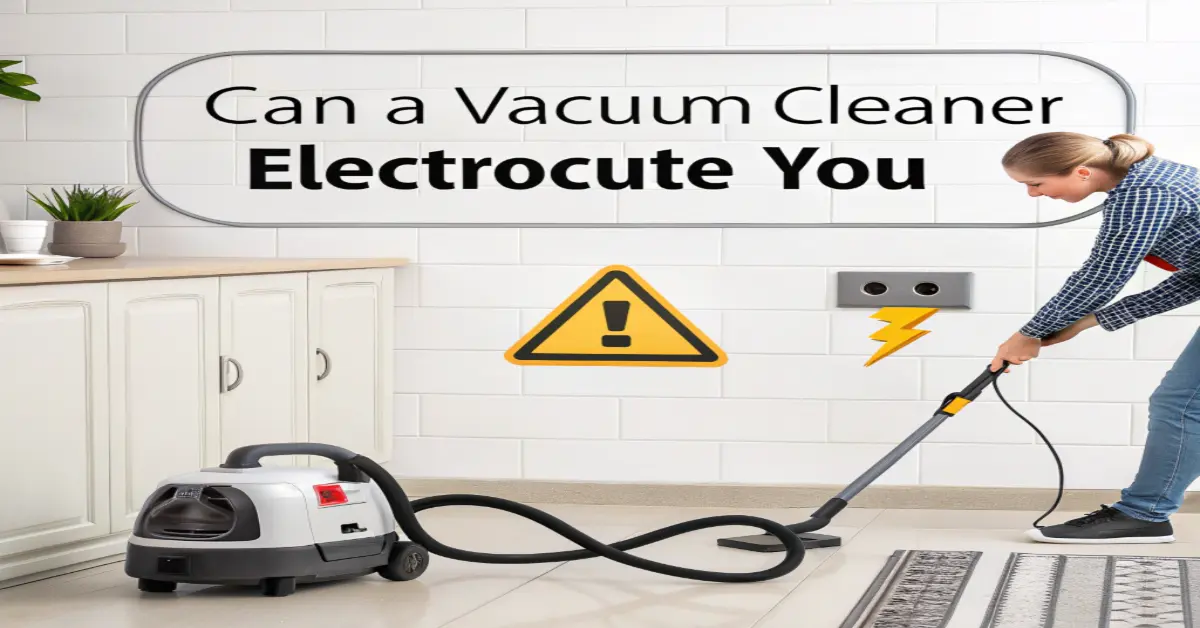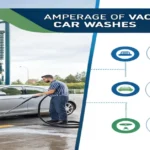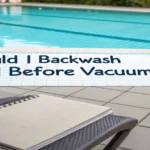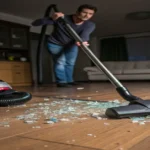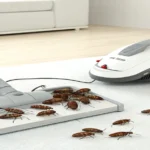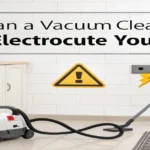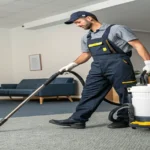Vacuum cleaners are essential tools for keeping our homes clean and dust-free. However, as with any electrical appliance, they come with potential risks that users often overlook.
One common concern is the possibility of an electric shock while using a vacuum cleaner. So, can a vacuum cleaner electrocute you?
Yes, under certain conditions, it can happen. Damaged power cords, faulty wiring, or using the vacuum in wet areas are the most common causes. Understanding these risks and taking preventive measures can help you use your vacuum cleaner safely and effectively.
In this guide, we’ll explore scenarios where a vacuum cleaner could pose an electrocution hazard and share practical safety tips to ensure your protection.
The Real Deal About Vacuum Cleaners and Electricity
Do you know that tingly feeling you sometimes get while vacuuming? Well, I remember this one time when my neighbor Jane got such a zap from her vacuum that she jumped three feet in the air!
While we had a good laugh about it later, it got me thinking about the serious side of vacuum cleaner safety.
Can Your Vacuum Electrocute You?
Let’s get real here – while total electrocution is rare, it’s not impossible. Think of it this way: your vacuum is like a car – generally safe, but potentially dangerous if improperly maintained.
Here’s what I’ve seen in my years of experience:
- Damaged power cords (usually from running over them – we’ve all done it!)
- Water exposure (that time someone tried to vacuum their flooded basement…)
- Worn-out internal wiring (especially in those handed-down family vacuums)
“I once had a customer bring in a vacuum that had been stored in their leaky garage for years. The amount of corrosion inside was terrifying!” – Mike, Appliance Repair Specialist
Why Does Your Vacuum Turn You Into a Human Lightning Rod?
Ever notice how you get more static shocks during winter? There’s some cool science behind this! When you’re pushing your vacuum across that carpet, especially on a cold dry day, you’re creating a mini lightning storm.
Here’s what’s happening:
- Your vacuum’s beater brush is dancing with your carpet fibers
- The dry air is making everything extra sparkly (electrically speaking)
- Your shoes might be insulating you (making that eventual zap even zappier!)
Modern Vacuum Safety Features (Thank Goodness for These!)
| Feature | What it Does | Why You’ll Love It |
| Ground wire | Prevents serious shocks | Peace of mind |
| Thermal cutoff | Stops overheating | No more burnt smells |
| Double insulation | Provides extra protection | Like a safety net |
Beat That Static – Tips from a Pro
After years of dealing with static-shocked customers, here are my favorite fixes:
- Spritz some anti-static spray on your carpet (works like a charm!)
- Keep a humidifier running (your nose will thank you too)
- Try touching a metal doorknob before touching anything else
- Consider those cool anti-static strips (they’re not just for cars!)
Red Flags That Scream “Danger!”
Listen up! If your vacuum is doing any of these, it’s time to pay attention:
- Making weird burning smells (not just that new-vacuum smell)
- Showing cord damage (duct tape is NOT a permanent fix!)
- Acting like a Fourth of July sparkler
- Getting suspiciously hot
Keeping Your Vacuum Happy (and Safe)
Just like you wouldn’t skip oil changes in your car, your vacuum needs some TLC too:
- Check that power cord like you check your phone – regularly!
- Empty the dust bag (before it looks like it’s about to burst)
- Give those filters some attention (they’re not just decoration)
- Keep the beater brush free from your pet’s entire fur collection
Vacuum + Water = Bad News
Picture this: You accidentally vacuum up some spilled water. Here’s your action plan:
- Unplug faster than you can say “Oops!”
- Don’t even think about turning it on
- Find a repair pro (seriously, this isn’t a DIY moment)
- Start saving for a new one, just in case
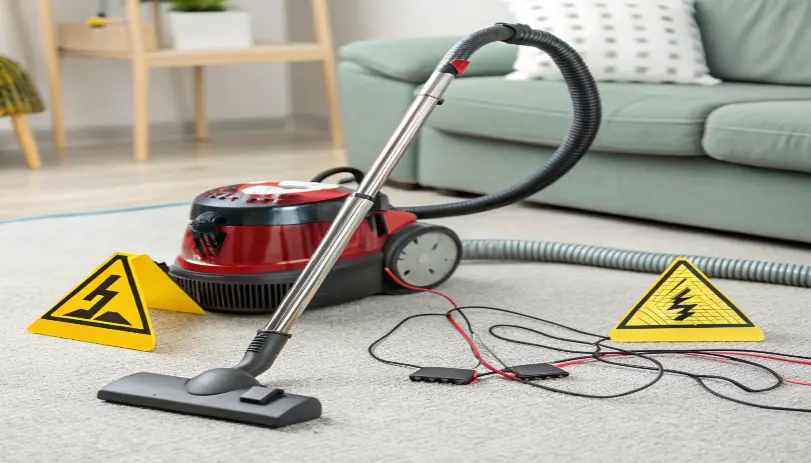
Real-Life Safety Tips (Because We’ve All Been There)
- Never vacuum with wet hands (I learned this the hard way!)
- Avoid those sharp objects (your vacuum isn’t a garbage disposal)
- Don’t play extension cord Olympics
- Keep the cord away from anything hot
Understanding Static Electricity in Different Environments
When it comes to static charge, it’s fascinating how different environments affect our experience with vacuum cleaners.
For instance, at your local grocery store, you might notice static buildup when pushing a cart handle – this is similar to how your vacuum creates static.
Interestingly, some places like toll booths have systems to ground the cars, preventing those annoying shocks as money is handed over.
This same principle could be applied to vacuum cleaning!
The Science Behind Grounding and Conductivity
Ever wonder why you’re safe until you set foot on the ground after vacuuming? It’s all about conductivity.
Just like how rubber tires insulate cars, your shoes can insulate you from the ground. The hose is conductive in many vacuum cleaners, especially in professional models like the Festool shop vacuum.
This conductivity can either help prevent or contribute to static buildup, depending on the design.
Industrial Applications and Solutions
In professional settings, static control goes beyond simple household solutions. For example, CT scanners in hospitals use similar principles to manage static electricity as industrial vacuum systems.
Some facilities even use specialized 20×24 filters and nozzles designed specifically to avoid picking up small particles while minimizing static buildup.
Unique Static Prevention Methods
Here’s something most people don’t know: just like how trucks drag ground wires to prevent static buildup, you can create a similar effect for your vacuum cleaner.
Some clever DIY enthusiasts have even adapted spark plug wire principles to help dissipate static charge. It’s about creating a path for the electrical charge to safely discharge, just like how a conductor works with voltage in other applications.
Pet-Specific Considerations
Pet owners, especially those with breeds like the Malte-poo, face unique challenges. These dogs’ fur can create thousands of static sparks during vacuuming.
The solution often involves more than just anti-static sprays – it’s about understanding how different surfaces and materials interact. Sometimes, simply pulling the vacuum in a different pattern can make a difference.
Advanced Safety Features and Modern Solutions
Modern vacuum cleaners have come a long way from the basic upright ones you might remember ever using.
Today’s models often include sophisticated user agreements and privacy policies, especially for smart-enabled versions.
They may feature advanced scorch prevention and specialized electrical outlet compatibility that makes them safer than ever before.
Professional Tips and Tricks
Thanks, Lee, a veteran vacuum repair specialist, shared this good conversation starter: “Most people don’t realize that when they shuffle across the carpet to build static, they’re creating the same effect as something at a toll booth.”
He suggests keeping the cleaner movement consistent and avoiding quick, jerky movements that can increase static buildup.
This information adds a new dimension to our understanding of vacuum cleaner safety and static electricity management, going beyond basic household tips to explore industrial applications and professional insights.
FAQ
Q: Will my cordless vacuum turn me into a human battery?
A: Nah, these are generally safer due to lower voltage, but still treat them with respect!
Q: How often should I replace the power cord?
A: If you see ANY damage, replace it immediately. That $20 cord is cheaper than a hospital bill!
Q: Does my fancy new carpet affect static buildup?
A: You bet! Those synthetic carpets are like static electricity factories.
Remember This Stuff (Your Safety Cheat Sheet):
- Always unplug before playing Vacuum Doctor
- Treat the cord like it’s made of gold
- Water and vacuums are mortal enemies
- Use proper outlets (no sketchy adapters!)
- Keep humidity levels comfy
- Inspect regularly (make it a Sunday ritual)
- Don’t DIY electrical repairs
- Get professional help annually
Pro Tip: If your vacuum starts acting weird, don’t wait to get it checked. Better safe than sorry!
This guide comes from years of seeing both the silly and serious sides of vacuum cleaner incidents. While most of the time you’ll just get a harmless zap, knowing these tips keeps you safe from the rare but real dangers.
Keep this guide handy, and happy cleaning!

Hey, I’m Abdul Manan, a vacuum enthusiast with a knack for simplifying cleaning. I love sharing tips, tricks, and insights to help you get the most out of your vacuum. Let’s tackle cleaning the smart way!
